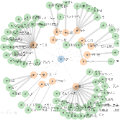Recent years, multi-hop reasoning has been widely studied for knowledge graph (KG) reasoning due to its efficacy and interpretability. However, previous multi-hop reasoning approaches are subject to two primary shortcomings. First, agents struggle to learn effective and robust policies at the early phase due to sparse rewards. Second, these approaches often falter on specific datasets like sparse knowledge graphs, where agents are required to traverse lengthy reasoning paths. To address these problems, we propose a multi-hop reasoning model with dual agents based on hierarchical reinforcement learning (HRL), which is named FULORA. FULORA tackles the above reasoning challenges by eFficient GUidance-ExpLORAtion between dual agents. The high-level agent walks on the simplified knowledge graph to provide stage-wise hints for the low-level agent walking on the original knowledge graph. In this framework, the low-level agent optimizes a value function that balances two objectives: (1) maximizing return, and (2) integrating efficient guidance from the high-level agent. Experiments conducted on three real-word knowledge graph datasets demonstrate that FULORA outperforms RL-based baselines, especially in the case of long-distance reasoning.
翻译:暂无翻译




